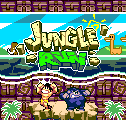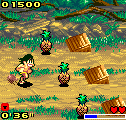Retro Replay Review
Gameplay
Jungle Run offers an adrenaline-pumping take on the classic Metrocross formula, tailored perfectly for mobile devices. Players guide Temu, a young Tarzan-like hero, through 24 increasingly challenging levels, racing against the clock to rescue his kidnapped fiancée from a fearsome gorilla. The core objective is deceptively simple: avoid floor traps, stay ahead of the timer, and make it to the finish line unscathed.
The game’s control scheme is intuitive yet demands precision. Using the numeric pad (2 for up/jump, 8 for down/crouch, 6 to accelerate, 4 to decelerate, and 5 for a standard jump), you’ll weave through banana peels, land on crocodile “skateboards,” and snag speed-boosting bonuses. Mastering the timing of each input becomes crucial as the levels ramp up in speed and obstacle density.
One of Jungle Run’s standout features is its two-plane scrolling system. Each of the four backgrounds can be mixed and matched between foreground and background layers, offering 16 unique visual configurations that also influence gameplay. Switching planes helps you dodge traps or find secret bonus paths, adding a strategic dimension to what might otherwise be a straightforward runner.
Beyond the main campaign as Temu, the game also lets you replay levels as the pursuing gorilla once you’ve completed all 24 stages. In this mode, you must keep pace with Temu and outmaneuver him to prevent the rescue—flipping the familiar run-and-jump dynamic on its head and doubling the longevity of the experience.
Graphics
Despite its humble mobile origins, Jungle Run boasts crisp, colorful pixel art that channels the charm of early handheld classics. The character sprites for Temu and the gorilla are well-animated, with smooth walk and jump cycles that lend personality to each frame. Even on smaller screens, the details—like the glint of a banana peel or the snapping jaws of an alligator—remain distinct.
The game’s palette shifts across four distinct environments: dense jungle foliage, misty swamps, rocky canyons, and nighttime riverbanks. Each setting is vibrant, and the layering effect of the two-plane parallax scrolling breathes life into what could have been a flat 2D scene. As you mix foreground and background layers, you’ll notice subtle shifts in color saturation and contrast, keeping the visuals fresh.
Level design cleverly incorporates graphical cues to telegraph upcoming hazards. For instance, a cluster of spiky plants in the background often hints at a trap on the active plane. While the resolution is tailored for early mobile hardware, the seamless animations and consistent frame rate ensure the action never feels sluggish or pixelated.
Transitions between levels include brief animated cutaways—such as Temu swinging from vine to vine or the gorilla pounding his chest—that add a cinematic flair. Though simple, these interludes reinforce the jungle adventure theme and break up the action pleasantly between fast-paced runs.
Story
Jungle Run presents a straightforward, archetypal rescue narrative that serves more as motivation than a deep plot. Temu’s fiancée has been kidnapped by a hulking gorilla, and it’s up to him to reclaim her. The premise evokes classic jungle tales, tapping into our instinctive desire to race against time for a loved one’s safety.
While there’s no extensive dialogue or cutscene-driven storytelling, the game sprinkles in context through brief written interludes between world changes. You get glimpses of the gorilla’s lair and tantalizing hints of hidden passages, inviting you to imagine a broader jungle kingdom beyond the 24 levels.
The flip-side gorilla mode adds a playful narrative twist. After rescuing his partner, you take control of the ape itself, now on the run from human pursuers. This role reversal doesn’t extend the storyline in a dramatic sense, but it does reinforce the classic hunter-and-hunted dynamic and provides a fresh perspective on the same stages.
Ultimately, Jungle Run’s story is lean by design, focusing squarely on the thrill of the chase. Fans of minimalist plots won’t be disappointed, while those seeking deep lore might look elsewhere. Here, the emphasis is squarely on gameplay and quick bursts of jungle adventure rather than sprawling narrative arcs.
Overall Experience
Jungle Run excels as a pick-up-and-play action runner, perfect for short commutes or quick gaming sessions. The 24 levels provide a satisfying difficulty curve, gradually introducing new obstacle types and higher speeds. Each run feels purposeful, and the urge to shave seconds off your best time becomes almost addictive.
The dual-plane parallax system and mixable backgrounds keep the visuals engaging, while the tight controls ensure frustration is kept to a minimum. Occasional trial-and-error moments arise when discovering new trap patterns, but they rarely feel unfair—more like a puzzle to solve with each replay.
Switching to gorilla mode after completing the main story adds welcome replay value. It’s a clever way to repurpose existing content and challenges you to apply the same skills in a reversed context. This mode also underscores the game’s playful spirit, reminding you that even monsters can have their own perspective.
For fans of retro-style action runners and bite-sized mobile adventures, Jungle Run offers a compelling package. It may not revolutionize the genre, but its tight controls, charming pixel art, and inventive level design make it a standout clone of Metrocross. Whether you’re chasing a damsel in distress or playing the beast on the loose, Jungle Run delivers an engaging jungle romp from start to finish.
 Retro Replay Retro Replay gaming reviews, news, emulation, geek stuff and more!
Retro Replay Retro Replay gaming reviews, news, emulation, geek stuff and more!








Reviews
There are no reviews yet.